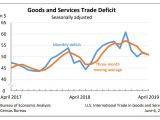Mike Hulme Goes Hippie Punching
June 6, 2019
There is a fair amount of discussion about a blog post by Prof. Mike Hulme in which he starts by poisoning the well, asking
A fair amount of paragraphs now ensues, an odd combination of nutpicking, confusion of concerns about extinctions, climate change and the future (if any) of the human race,
It's like Hulme only reads the Daily Mirror to get information about what the problems are, the old Newsweek said back in 1975 that the world was going to freeze in spades. Now, were Eli as young as he used to be, he would romp through the rest of Prof. Hulme's ruminations with glee pointing out the ear spinning speed at which he jumps from one set of issues to another, confusing them to buttress his arguments. Yes, there is much to make light of, but there are, Eli thinks two important points that illustrate best the what is afoot.
The first is the claim
Climate change driven by increasing greenhouse gases is cumulative. We need to get net emissions to zero as quickly as possible to avoid dangerous changes. The best information is that staying even under 2 C or even going above it for a short time will require unproven carbon storage technologies.
In short iterative is an old man's moral corruption.
A denier is a person who denies something, “… who refuses to admit the truth of a concept or proposition that is supported by the majority of scientific or historical evidence.” If I do not believe that climate change will drive the human species to extinction, does that make me an extinction denier? For I do not believe that there is good scientific or historical evidence that climate change will lead to human extinction.Walking along Twitter Street Eli stops to look at the cardboard box that Prof. Hulme has set before him, is shown the Queen of Hearts:
A denier is a person who denies something, “… who refuses to admit the truth of a concept or proposition that is supported by the majority of scientific or historical evidence.”A reasonable proposition, think anti-Vaxxers, climate change deniers, moon landing was faked types, but now the shuffle, hey, Eli can win that game, so quick shuffle and what happens?
If I do not believe that climate change will drive the human species to extinction, does that make me an extinction denier? For I do not believe that there is good scientific or historical evidence that climate change will lead to human extinction.which confuses concerns increasingly raised, with scientific, need Eli say this, consensus. So Eli would say, here is not good grounds for thinking the good Prof. Hulme an extinction denier, but rather a three argument monte operator of long practice with an array of confederates salting the audience.
A fair amount of paragraphs now ensues, an odd combination of nutpicking, confusion of concerns about extinctions, climate change and the future (if any) of the human race,
Across the Atlantic the American commentator Tom Englehardt has placed humanity on a suicide watch for itself. “Even for an old man like me”, he says, “it’s a terrifying thing to watch humanity make a decision, however inchoate, to essentially commit suicide.” And in David Wallace-Wells’ best-selling book, An Uninhabitable Earth, he claims that climate change is “much, much worse than you think”Whatever you think of these two statements, they are not the same. Either one or the other can be true or false. There are multiple threats to our civilization and to people collectively and individually. Hulme mashes everything together to avoid dealing with each separately and then looking for connections. The issues are climate change, rapid extinction of multiple species upon which the Earth system and humanity depend for ecological services and more and the effect that these challenges will and are having on human civilizations and humans.
It's like Hulme only reads the Daily Mirror to get information about what the problems are, the old Newsweek said back in 1975 that the world was going to freeze in spades. Now, were Eli as young as he used to be, he would romp through the rest of Prof. Hulme's ruminations with glee pointing out the ear spinning speed at which he jumps from one set of issues to another, confusing them to buttress his arguments. Yes, there is much to make light of, but there are, Eli thinks two important points that illustrate best the what is afoot.
The first is the claim
And finally the rhetoric of climate and extinction does not help us morally. Even if we take these claims literally, the mere fact of human extinction by no means impels us to conclude that the correct moral response must be to prevent that extinction. There may well be other moral demands upon us which take precedence, and yet which we ignore. Why the human species above other species? Why are the future unborn more morally demanding of us than the dispossessed victims of today? Why is suicide the worst sin of all?identified as moral corruption by Stephen Gardiner, as reported on this blog many years ago in relation to delaying action on climate change
the presence of the problem of moral corruption reveals another sense in which climate change may be a perfect moral storm. This is that its complexity may turn out to be perfectly convenient for us, the current generation, and indeed for each successor generation as it comes to occupy our position. . . By avoiding overtly selfish behavior, earlier generations can take advantage of the future without the unpleasantness of admitting it – either to others, or, perhaps more importantly, to itself.Many false dichotomies ensue. It boils down to we can't. But yet, there is another point which illustrates how Hulme really does not understand the nature of the challenges we face
What climate change means is not ‘revealed truth’ emerging from some scientific script. The political meanings and individual and collective responses to climate change have to be worked out iteratively. They have to be negotiated within the political structures and processes we inhabit, negotiations that can’t be circumvented by an appeal to the authority of science being ‘on our side’. (Of course this must also include the possibility of renegotiating some of those same political structures).That ship sailed in the 1990s. It dangerously misses the point that climate change and extinctions are cumulative. The extinction of a species that is important to the web of life is final. Others species might arise to fill the niche, but not quickly, and if enough species go extinct perhaps the niche itself will vanish. That is extremely dangerous.
Climate change driven by increasing greenhouse gases is cumulative. We need to get net emissions to zero as quickly as possible to avoid dangerous changes. The best information is that staying even under 2 C or even going above it for a short time will require unproven carbon storage technologies.
In short iterative is an old man's moral corruption.


